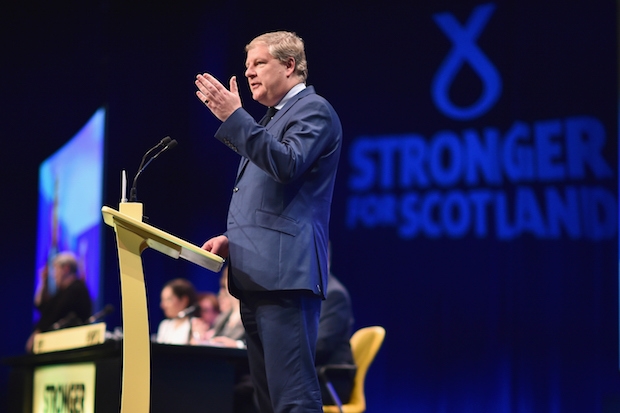The SNP didn’t win the independence referendum, but is still talking about the lessons it can learn from what happened a year later. That’s because it wants to win the next one – and everyone at this conference believes that the next referendum only has question marks about when, not if, it will happen.
SNP Westminster leader Angus Robertson suggested at a fringe organised by The Times this lunchtime that two major lessons he’d learned from last year’s result were that older voters would not be persuaded to vote ‘Yes’ as easily by younger generations than he had imagined they would be, and that the ‘Yes’ campaign failed to communicate effectively with those voters who came from the rest of the UK. He said:
‘Was there a feeling that 16 and 17 year olds could be persuaded to vote Yes? I was very confident of that but what I underestimated was, and this is perhaps more a reflection of the fact that… if you are 16 years old, your memory of political debate and discussion is quite recent, and my experience of speaking in schools was certainly that the beginning of the process was there was a lack of reference points for a lot of younger voters…
‘Why I think that’s relevant is because I don’t think there was an intergenerational effect that I imagined was possible or likely and by that I mean younger folks saying to their grandparents that they’ve decided to vote yes, how are you voting, grandparents, we knew that that was probably going to be more difficult with older voters but if you have an intergenerational effect, you could have the persuasive power of younger voters being able to persuade grandparents and grandmothers that it was not just about an older generation but it was about future generations…
‘I definitely underestimated the fact that it would take as long as it did for younger voters to get to where they got to and it was too short a period then for that intergenerational effect to have an impact that for me is one of the largest lessons.’
Robertson said the second lesson was that ‘there was not a vision communicated effectively enough’ to voters from elsewhere in the UK that persuaded them to back independence.
He was later asked whether he thought that Nicola Sturgeon would have won the first referendum had she been SNP leader at the time, rather than Alex Salmond. She has a much better appear to female voters than Salmond, so it’s a good question – though a number of members at the fringe seemed to think it was rather impertinent. ‘Who knows?’ replied Robertson, adding that it wasn’t just the SNP who were in the ‘Yes’ campaign, but the Greens and other parties.’
Robertson is a good speaker, not least because he’s able to dodge questions like the above about Salmond’s ability to put some voters off. It was striking how often he returned to complaining about the way the press overwhelmingly opposed independence, and the party’s grievances with the BBC’s coverage of the referendum, too. He argued that newspapers were harming themselves with their decisions to support the ‘No’ side, and that the BBC needed to address the problem of low trust in the media in Scotland too. None of these complaints were new – but given the enthusiastic reaction from members in the hall to them, it seems that another lesson that Robertson has learned from the referendum is that bashing the media has its uses, too.







Comments